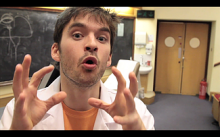Giving Shouldn’t Happen -- So Why Do We Still Do It?
(Inside Science) -- Biologists call it prosocial behaviour, philosophers call it altruism… most of us just call it giving.
Giving is a psychological conundrum -- it loses us valuable resources, so we might expect it to make us feel bad. But studies consistently find that giving things away makes us happier.
And we’re about to test that theory out.
So far, it seems giving feels good -- so how can this happen when our brain is geared to reward actions that benefit ourselves?
Scan peoples brains and get them to give and you’ll get a surprising result: the same system that rewards you for selfish actions also rewards you for generous ones.
But wait, how does the same activity, in the same neurons, from the same brain area, code for opposite things?
The answer is hiding in the rest of brain.
The system that rewards us for giving, or the ‘reward system’, as it’s imaginatively known, receives controlling input from all over the brain:
From the Pre-Frontal Cortex – which processes complex and moral planning, from the Orbito-Frontal Cortex – which does anger and disgust; from the mirror neurons in the Amygdala and from the more mysterious Insula and subgenual areas – both implicated in social reward and mood.
These different brain areas compete or come together to activate or suppress the reward system. So both generous and selfish motives end up working through the same pathways.
Whenever the reward system is turned on, our brain receives a burst of dopamine, but other neurotransmitters are also important for giving: both oxytocin, which stimulates trust, and serotonin.
Interestingly: serotonin is made from L-tryptophan -- a chemical found in egg whites -- dosing people with L-tryptophan increases their charitable giving. Three eggs per rich relative should do the trick.
So did our experimental data match the theory? We ran the numbers. Then we did some statistics. Then we made a graph, just to be sure. And yes: people who gave the money away felt better than those who spent it on themselves.
So we saw how giving makes us feel good -- but to look at why it feels good, we’d need to see the evolution of social interactions and the long-term rewarding consequences of short-term loss…but there’s no time in this video.
Just remember: giving feels good and your brain rewards you for it -- and in fact giving to those close to you, friends or family, has been found to reward you even more.
So this festive season, sack off the socks and get down to some serious giving.

